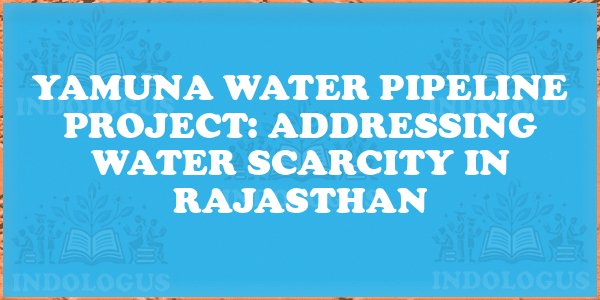In a significant move to alleviate water scarcity in Rajasthan, Haryana and Rajasthan have signed a Memorandum of Understanding (MoU) for the Yamuna Water Pipeline Project. This project aims to supply 577 MCM water annually to Rajasthan districts using underground pipelines from Hathnikund in Haryana.
Key Features of the Yamuna Water Pipeline Project
- MoU for Joint DPR Development: Both states will collaborate on a Detailed Project Report (DPR) and form a Task Force for project oversight.
- Project Scope and Phase-1 Details: Transfer 577 MCM of water annually to Churu, Sikar, Jhunjhunu districts during monsoon months.
- Use of Underground Pipelines: Water transport through underground pipelines to minimize losses.
- Conditions for Water Transfer: Water diversion only after fulfilling Haryana’s needs through Western Yamuna Canal.
Project Scope and Phase-1 Details
- Water Transfer Plan: Transfer 577 MCM of water annually from Hathnikund to Churu, Sikar, Jhunjhunu districts.
- Use of Underground Pipelines: Efficient water transport through underground pipeline system.
Conditions for Water Transfer
- Post-Fulfillment of Haryana’s Needs: Surplus water diversion only after meeting Haryana’s water requirements through Western Yamuna Canal.
Significance of the Project
- Addressing Water Stress in Rajasthan: Improving drinking water supply in water-stressed districts of Rajasthan like Churu, Sikar, and Jhunjhunu.
- A Model for Inter-State Collaboration: Promoting cooperative water management between states for sustainable resource use.
Key Takeaways for Competitive Exams
- Understanding of the Yamuna Water Pipeline Project between Haryana and Rajasthan.
- Importance of inter-state water cooperation in addressing water scarcity.
- Significance of sustainable water resource management in arid regions.



